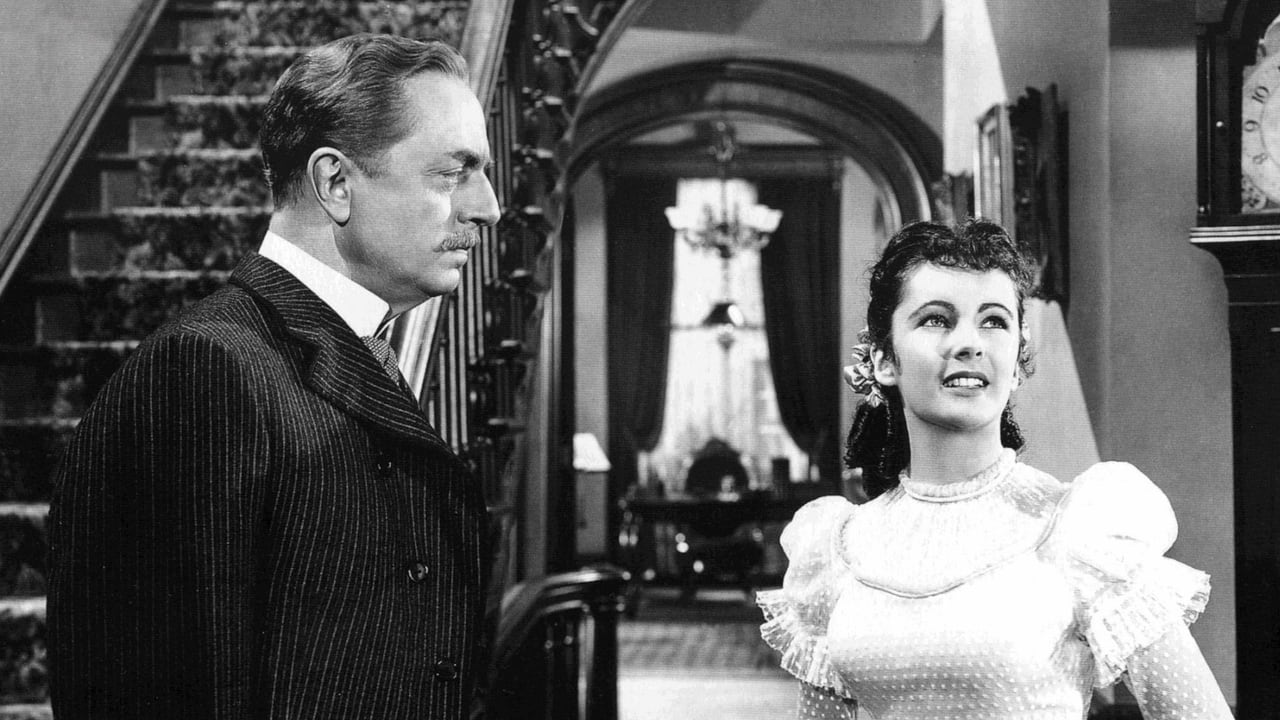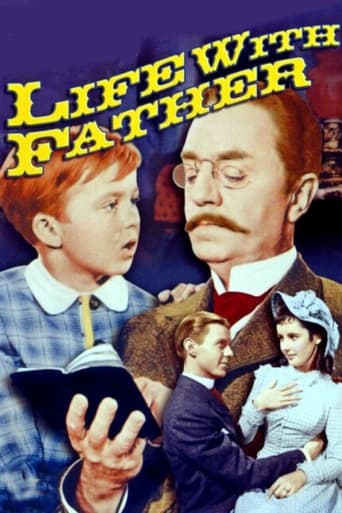Kidskycom
It's funny watching the elements come together in this complicated scam. On one hand, the set-up isn't quite as complex as it seems, but there's an easy sense of fun in every exchange.
Hulkeasexo
it is the rare 'crazy' movie that actually has something to say.
Joanna Mccarty
Amazing worth wacthing. So good. Biased but well made with many good points.
Jakoba
True to its essence, the characters remain on the same line and manage to entertain the viewer, each highlighting their own distinctive qualities or touches.
liublok
Movie very well represent extremist time, time of religion. Just awful time. I'll show this movie to my children, to show them how was time of extreme religion when people didn't think with their head.
jacobs-greenwood
The film, based upon the life of Clarence Day Sr., a governor on the New York Stock Exchange in 1883, AND the longest running non-musical Broadway stage play at the time, received only three minor Oscar nominations: Color Art Direction-Set Decoration, Cinematography and Score, though William Powell (in the title role) earned his third and last Best Actor nomination. Despite an outstanding leading actress performance by Irene Dunne, as Day's spouse Vinnie, neither Dunne nor the picture received Academy Award nominations.While some may dismiss Life With Father (1947) for its dated (to the point of archaic) expressions and attitudes about life, they should remember that it was quaint at the time of its release. Indeed, it's a time capsule of pre-turn-of-the-century New York, when men were the unquestioned heads of their nuclear families; or were they? In fact, as bombastic and outspoken as (Powell's) Day is, he is in fact manipulated in subtle ways by his wife (Dunne's) Vinnie, whom he loves dearly. On the surface, Day is in charge of the money and every household decision, many of which he makes demonstratively by loudly proclaiming his dominance while often belittling his wife's lack of sound logic. Vinnie, however, while she respects her husband's traditional position and accepts that he has a superior intellect, doesn't passively allow herself to be bowled over by him. She sticks to her principles and even wrongheaded notions in a 'forceful' yet nonthreatening way – though perhaps a little too frequently by crying – such that "Clare" (for Clarence), out of his love for her or sometimes just exasperation, has to give in.There are hilarious scenes concerning the family finances which begin with Vinnie humbly having to ask for money or explain her spending that leave Clare confused and Vinnie with the cash or her desired result: a porcelain pug dog is returned to pay for their son's new suit of clothes. This "battle of the sexes" scenario is then transferred generationally when a "puppy dog romance" develops between Clarence Jr. (Jimmy Lydon) and visiting Cousin Cora's (Zasu Pitts) traveling companion Mary Skinner, played by 15-year old Elizabeth Taylor. After a lesson about the need to "be firm" with women from Clarence Sr. – a priceless scene, that immediately precedes one in which Clare follows the advice he'd just given his son with Vinnie, telling her "it's for your own good" when she cries – Junior tells Mary that she must write him the minute she returns home from her visit to New York. But having been properly schooled, Mary of course is determined to have him write to her first; she strikes a balance between using her tears and her will to get her way. Like Clare, who doesn't know what he said that brought his wife to tears, Junior is also clueless that he's been manipulated, and he enthusiastically starts to write his first letter to Mary even before her horse cab has left their street. Outwardly, the males have the authority but it's the females that wield real power, something that's not really confined to the 19th century.The other major storyline that demonstrates "who wears the pants in the (Day) family" has to do with the revelation that Clare has yet to be baptized. Vinnie is convinced that her husband won't be able to enter Heaven without correcting the situation, the sooner the better, and enlists the support of their children and the Reverend Dr. Lloyd (Edmund Gwenn). But Clarence Sr. is adamant that he doesn't need to be baptized, saying "They can't keep me out of Heaven on a technicality" and "if there's one place the Church should leave alone, it's a man's soul!" Upset - or "stirred up" as Clare would say - over her husband's eternal life, Vinnie falls ill, which is made worse when her entrepreneurial sons, Clarence Jr. and John (Martin Milner's screen debut), put "Bartlett's Beneficent Balm" – a 'miracle' cure they've signed up to sell – in her tea, thinking it will help with her "women's complaints". But their mother then really does become ill and the normally prudent Clare spares no expense to get Vinnie well, even promising her that he'll be baptized if she'll just pull through. When she does, he tries to excuse his actions and the argument continues, but in the (literal) end, as always, Vinnie gets her way.A couple of other odds & ends worth mentioning: one of the ways that Clarence Sr.'s eccentricities are conveyed is through the continuous flow of maids that the family goes through; he inadvertently scares them into quitting or fires them for incompetence. Even when he tries to intervene in his wife's affairs by hiring a replacement, Vinnie lets her go because the maid's outfit doesn't fit her. There's also a curious physical gesture that one of the maids does after exclaiming "a redhead" each time she notices the hair color of the Day's children; she licks two fingers on her right hand before slapping them, and then her fist, into her left palm. "Oh Gad", I almost forgot, some of the expressions such as this favorite exclamation of Clarence Sr. are priceless, including falderal – akin to poppycock – and "confound it".Michael Curtiz directed the Donald Ogden Stewart screenplay, which transformed the successful play by Howard Lindsay and Russel Crouse – based on Clarence Day Jr.'s memoir – into movie sets for some scenes and dramatized others that were only referred to in the play. Rounding out the credited cast: Emma Dunn played the Day's longtime cook Margaret, Moroni Olsen played Dr. Humphries, Elisabeth Risdon was Mrs. Whitehead, Derek Scott was the Day's youngest son Harlan who adopts a dog and Johnny Calkins their third oldest Whitney (had to learn his catechism), Monte Blue was the policeman, Frank Elliot was Dr. Somers and Heather Wilde, Mary Field, Queenie Leonard and Nancy Evans were the string of maids.
Karl Ericsson
There was a time, when films like this one were "cute". This was before we knew what was really going on in these times and, for that matter, what is still going on. We now know that "cute" is not the right way to describe a mass murderer, even if the guy is so full of himself that he could never understand that it is not all right to treat other people like exploitable trash.The film depicts a time in American history in which the working class hardly reached the age of thirty. They were treated worse than slaves and it was people like this "father" that did the treating.Of course there is not one frame of that in this "cute" movie. Here the problems does not deal with the murder that is going on in the background - way back in the background.What is this movie about? I think it is lies, lies and republicans. It is about wasting your life and dedicate it to evil beyond all evil and on the surface of it all, it is just "cute".The three stars is for William Powell, who plays the villain with gusto.
wes-connors
In 1883 New York, bombastic Madison Avenue patriarch William Powell (as Clarence "Clare" Day) scares off a succession of servants chosen by his sweet-natured wife, Irene Dunne (as Vinnie). Mr. Powell directs Ms. Dunne to run the house like a business, but his bark is worse than his bite. The couple is raising four red-haired sons - violinist Jimmy Lydon (as Clarence Jr.) is getting ready for Yale, girl-conscious Martin Milner (as John) dabbles with electricity, baseball fan Johnny Calkins (as Whitney) is practicing for his confirmation, and youngest Derek Scott (as Harlan) is confused about his dog's gender.Dunne gets the home ready for a visit from favorite cousin Zasu Pitts (as Cora Cartwright) and her beautiful teenage ward, Elizabeth Taylor (as Mary Skinner). Ms. Taylor becomes a romantic interest for Mr. Lydon, who wasn't sure he liked girls before her arrival. But, the cute young couple may be compromised by religion - Lydon is Episcopalian while Taylor is Methodist.Additionally, Powell, who dislikes house-guests, reveals a family secret - he was never baptized. Dunne wants the situation remedied, fearing God may deny her husband entry to Heaven. But, Powell believes God would make an exception in his case.The above cast, including Edmund Gwenn (as Reverend Lloyd), play their Christian manners and customs beautifully, under expert direction from Michael Curtiz. Powell was "Oscar" nominated for "Best Actor" of the year and won the "New York Film Critics" award (with his then current "The Senator Was Indiscreet" mentioned as a secondary concern). In the "Film Daily" poll, Mr. Curtiz' direction was the year's sixth best. Producer Robert Buckner, Dunne, Lyndon, debuting Milner, musician Max Steiner, and the set decoration are also award-worthy. Writer Donald Ogden Stewart adapted the long-running stage play well."Life with Father" was once more highly regarded, and may yet come back into favor. Its datedness, often stated as a deterrent, is entirely appropriate. And, it does seem to go on just a little too long, but it's still a classic period piece.Unfortunately, (Powell as) Day's famous line, "I'm going to be baptized, damn it!" was bastardized to simply "I'm going to be baptized." With modern technology being what it is, the stinging "…damn it!" should be digitally reinstated.********* Life with Father (8/14/47) Michael Curtiz ~ William Powell, Irene Dunne, Jimmy Lydon, Elizabeth Taylor

